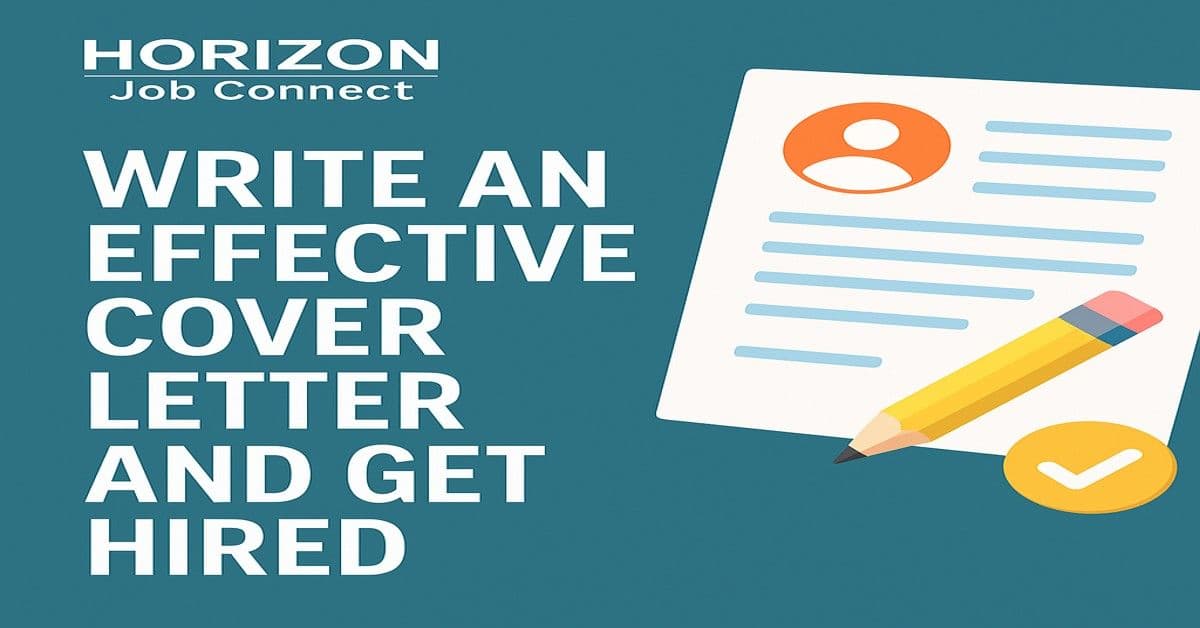
Write an Effective Cover Letter and Get Hired !!!
Updated April 4, 2025
Introduction
A cover letter is one of the most powerful tools in your job search. It serves as your first impression to a potential employer, showcasing not only your skills and experience but also your enthusiasm and personality. Many job seekers underestimate the importance of a well-crafted cover letter, but the truth is that an effective cover letter can set you apart from other candidates and increase your chances of landing an interview.
At Horizon Job Connect (horizonjobconnect.com), we help job seekers create compelling cover letters that make employers take notice. In this guide, we’ll walk you through the key elements of an effective cover letter and provide tips to ensure yours stands out.
1. Why a Cover Letter Matters
A cover letter is more than just a formality—it’s an opportunity to make a personal connection with the hiring manager. A great cover letter:
- Demonstrates your enthusiasm for the role.
- Highlights key achievements relevant to the job.
- Provides context to your resume.
- Shows your understanding of the company and its values.
Employers appreciate candidates who take the time to craft a tailored cover letter instead of sending a generic one.
2. Structuring Your Cover Letter for Maximum Impact
A well-structured cover letter is easy to read and effectively communicates why you are the right fit for the job. Follow this format:
A. Header
Include your name, contact information, and the date at the top of your cover letter. Below that, list the employer’s name, title, company name, and address.
B. Salutation
Whenever possible, address the hiring manager by name (e.g., "Dear Mr. Smith"). If the name is not available, use a professional greeting such as "Dear Hiring Manager."
C. Opening Paragraph
Grab the reader’s attention by mentioning the specific job you’re applying for and briefly explaining why you are excited about the opportunity.
Example:
"I am excited to apply for the [Job Title] position at [Company Name]. With a passion for [industry-specific skill], I am eager to bring my expertise in [relevant experience] to your team."
D. Middle Paragraph(s)
This is where you highlight your skills and accomplishments. Use specific examples that demonstrate how your experience aligns with the job description.
Tips:
- Use bullet points to make key achievements stand out.
- Include quantifiable results (e.g., "Increased sales by 20% in six months").
- Relate your experience directly to the company’s needs.
Example:
"In my previous role at [Previous Company], I managed a team that improved operational efficiency by 30%. I take pride in my ability to lead and implement strategic initiatives that drive success."
E. Closing Paragraph
End with a strong closing statement that reinforces your interest in the role and invites further discussion.
Example:
"I would welcome the opportunity to discuss how my skills align with your company’s goals. Thank you for your time, and I look forward to hearing from you soon."
F. Signature
End with a professional closing such as "Sincerely" followed by your full name.
3. Common Mistakes to Avoid in a Cover Letter
Even strong candidates can make cover letter mistakes. Avoid these pitfalls:
- Using a generic template: Personalize each cover letter for the specific role and company.
- Repeating your resume: Use the cover letter to expand on your achievements rather than summarizing your resume.
- Failing to proofread: Typos and grammatical errors can make a bad impression.
- Being too lengthy: Keep your cover letter concise and to the point (one page is ideal).
- Not showing enthusiasm: Hiring managers want candidates who are genuinely interested in the role.
4. Customizing Your Cover Letter for Each Job
One of the biggest mistakes job seekers make is sending the same cover letter to every employer. To maximize your chances of getting hired:
- Research the company’s values and mention why they resonate with you.
- Tailor your skills to the job’s specific requirements.
- Use keywords from the job posting to increase the likelihood of passing applicant tracking systems (ATS).
5. Cover Letter Example
Here’s a sample cover letter to help you get started:
[Your Name]
[Your Address]
[City, State, ZIP Code]
[Your Email]
[Your Phone Number]
[Date]
Hiring Manager’s Name
[Company Name]
[Company Address]
[City, State, ZIP Code]
Dear [Hiring Manager's Name],
I am excited to apply for the [Job Title] position at [Company Name]. With a background in [industry], I have successfully [mention key achievement relevant to the role]. My expertise in [relevant skill] has allowed me to [specific impact or accomplishment].
At [Previous Company], I [describe a notable project or responsibility], which resulted in [measurable success]. My ability to [specific skill] makes me a strong candidate for this role. I am confident that my experience and passion for [industry] align with your company’s mission.
I would love the opportunity to further discuss how I can contribute to your team. Thank you for your time, and I look forward to speaking with you.
Sincerely,
[Your Name]
6. Final Tips to Make Your Cover Letter Stand Out
- Keep it professional yet engaging.
- Use active language and avoid passive phrases.
- Align your skills and experience with the employer’s needs.
- Always proofread before submitting.
Conclusion
A well-written cover letter can significantly increase your chances of securing an interview. By following these guidelines and tailoring your approach to each job application, you can make a lasting impression on hiring managers.
At Horizon Job Connect ( horizonjobconnect.com ), we provide job seekers with valuable career resources, job listings, and expert guidance to help them land their dream jobs. Start crafting your standout cover letter today and take the next step toward career success!
For more job search tips, visit horizonjobconnect.com
